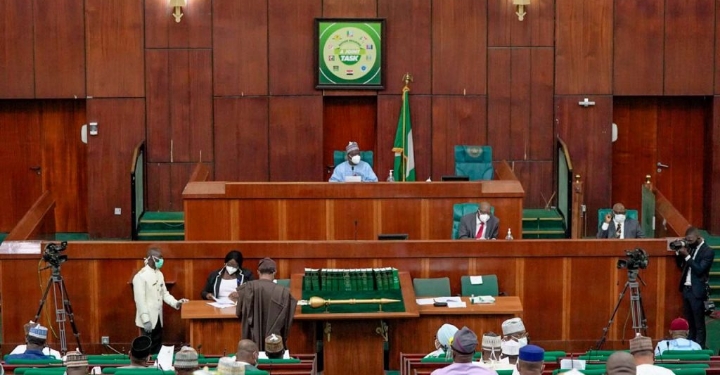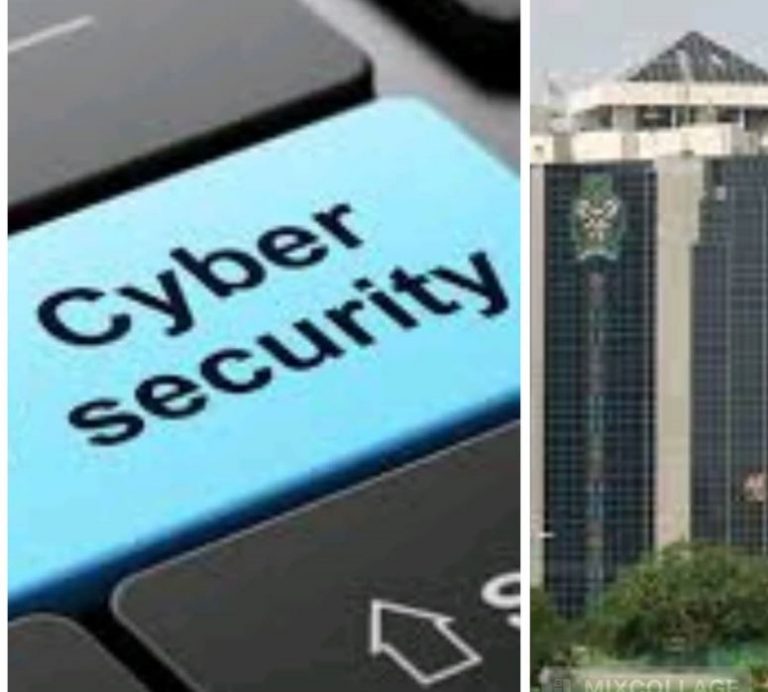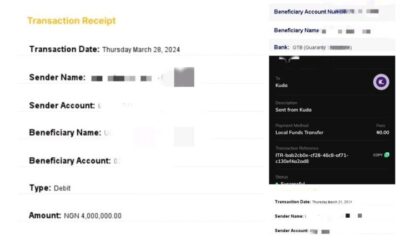Business
‘We’re Working To Settle Nigeria, UAE Flight Row’ – Speaker
Published
2 years agoon
By
Editor
Speaker of House of Representatives, Hon Femi Gbajabiamila, on Tuesday, held a meeting with the Ministers of Aviation, Senator Hadi Sirika, Foreign Affairs, Chief Onyema Ugochukwu and his junior over the flight ban between the United Arab Emirates (UAE) and Nigeria.
The meeting which was at the instance of the Speaker lasted for three hours behind close doors at the National Assembly complex in Abuja.
The meeting, the Speaker later told journalists was to find solution to the impasse between Nigeria and the United Arab Emirate which noted was robustly discussed.
He described the diplomatic relationship between Nigeria and the United Arab Emirate as crucial that should not be allowed to collapse.
“The United Arab Emirates has a long standing relationship between Nigeria and it should not be allowed to collapse as both countries stands to benefit much more economically.”
Also present at the meeting were representatives of Emirates Airline, the Chairman/CEO of Air Peace, Allen Onyema, and heads of agencies in the aviation sector.
The Speaker explained that steps taken to address the issues and that “in the next couple of days, this matter will be sealed, I believe. We’re engaged in parliamentary diplomacy. That’s what we’re doing.
“We’re not going to allow this to mar the giant strides made between the two countries.”
The Speaker noted that the UAE Government had already written Air Peace to allow the airline to operate seven slots of flights.
READ ALSO: UAE Makes U-turn, Accepts Nigerian Passengers
He commended the two ministers for their efforts in resolving the issues even as he appreciated Nigerians for their sacrifices and for standing by the Nigerian Government on the face-off.
On his part, the Minister of Foreign Affairs, Geoffrey Onyema, said the meeting under Gbajabiamila’s leadership was a fruitful one, noting that the action pointed to the relevance of Executive-Legislative engagements.
He said they were hopeful that all the issues would be resolved in no distant future.
You may like


JUST IN: UAE Lifts Visa Ban On Nigerians After Almost One Year


UAE Orders Arrest Of Man Filmed Buying Luxury Cars, Splashing Cash


Buhari Calls For Suspension Of Blanket Visa Ban By UAE


UAE Imposes Visa Ban On Nigerians, Rejects Applications


UAE President, Sheikh Khalifa Bin Zayed Al Nahyan Is Dead


JUST. IN: UAE Conviction: US Sanctions 6 Nigerians For Sponsoring Boko Haram
Business
FULL LIST: CBN Publishes List Of Licensed Deposit Money Banks
Published
5 hours agoon
May 8, 2024By
Editor
The Central Bank of Nigeria has released a comprehensive list of licensed Deposit Money Banks operating within the country.
The list, which was made public on the CBN’s official website on Tuesday, provides insights into the banking landscape in Nigeria.
Banks with international authorisation include Access Bank Limited, Fidelity Bank Plc, First City Monument Bank Limited, First Bank Nigeria Limited, Guaranty Trust Bank Limited, United Bank of Africa Plc, and Zenith Bank Plc.
READ ALSO: BDC Operators Arrested As Naira Sells 1,416/$
Commercial banks with national authorisation include Citibank Nigeria Limited, Ecobank Nigeria Limited, Heritage Bank Plc, Globus Bank Limited, Keystone Bank Limited, Polaris Bank Limited, Stanbic IBTC Bank Limited, Standard Chartered Bank Limited, Sterling Bank Limited, Titan Trust Bank Limited, Union Bank of Nigeria Plc, Unity Bank Plc, Wema Bank Plc, Premium Trust Bank Limited and Optimus Bank Limited.
Commercial banks with regional licenses are Providus Bank Limited, Parallex Bank Limited, Suntrust Bank Nigeria Limited, and Signature Bank Limited.
Players in the non-interest banking sector with national authorisation include Jaiz Bank Plc, Taj Bank Limited, Lotus Bank Limited, and Alternative Bank Limited.
READ ALSO: [ICYMI]FULL LIST: 16 Banking Transactions Exempted From CBN’s New
In the merchant banking category, the apex banks listed, are Coronation Merchant Bank Limited, FBN Merchant Bank Limited, FSDH Merchant Bank Limited, Greenwich Merchant Bank Limited, Nova Merchant Bank Limited, and Rand Merchant Bank Limited.
The financial holding companies listed were Access Holdings Plc, FBN Holdings Plc, FCMB Group Plc, FSDH Holding Company Limited, Guaranty Trust Holding Company Plc, Stanbic IBTC Holdings Plc, and Sterling Financial Holdings Limited.
The Mauritius Commercial Bank Representative Office (Nigeria) Limited was listed as the sole representative office.
Business
[ICYMI]FULL LIST: 16 Banking Transactions Exempted From CBN’s New
Published
2 days agoon
May 7, 2024By
Editor
The Central Bank of Nigeria on Monday directed all banks to commence charging a 0.5 per cent cybersecurity levy on all electronic transactions within the country.
The apex bank stated this in a circular signed by the Director, Payments System Management Department, Chibuzo Efobi; and the Director, Financial Policy and Regulation Department, Haruna Mustafa; a copy of which was obtained by The PUNCH.
The circular, which was directed to all commercial, merchant, non-interest, and payment service banks, among others; noted that the implementation of the levy would start two weeks from Monday, May 6, 2024.
READ ALSO: Five Things To Know About The New Cybersecurity Levy To Be Paid By Nigerians
“The levy shall be applied at the point of electronic transfer origination, then deducted and remitted by the financial institution. The deducted amount shall be reflected in the customer’s account with the narration, ‘Cybersecurity Levy,’” the circular partly read.
In this piece, The PUNCH highlights all the 16 banking transactions that are exempted from the CBN’s new cybersecurity levy:
Loan disbursements and repayments
Salary payments
Intra-account transfers within the same bank or between different banks for the same customer
Intra-bank transfers between customers of the same bank
Other Financial Institutions instructions to their correspondent banks
Interbank placements,
Banks’ transfers to CBN and vice-versa
Inter-branch transfers within a bank
Cheque clearing and settlements
Letters of Credits
READ ALSO: FG To Delist Naira From P2P Platforms
Banks’ recapitalisation-related funding – only bulk funds movement from collection accounts
Savings and deposits, including transactions involving long-term investments such as Treasury Bills, Bonds, and Commercial Papers.
Government Social Welfare Programmes transactions e.g. Pension payments
Non-profit and charitable transactions, including donations to registered non-profit organisations or charities
Educational institutions’ transactions, including tuition payments and other transactions involving schools, universities, or other educational institutions
Transactions involving bank’s internal accounts such as suspense accounts, clearing accounts, profit and loss accounts, inter-branch accounts, reserve accounts, nostro and vostro accounts, and escrow accounts.
Business
ICYMI: Five Things To Know About The New Cybersecurity Levy To Be Paid By Nigerians
Published
2 days agoon
May 7, 2024By
Editor
The Central Bank of Nigeria, on Monday, directed banks and other financial institutions to start charging a cybersecurity levy on all banking transactions.
According to the circular sighted by The PUNCH, the implementation of the levy would start in two weeks.
The circular read in part, “Following the enactment of the Cybercrime (Prohibition, Prevention, etc) (amendment) Act 2024 and pursuant to the provision of Section 44 (2)(a) of the Act, ‘a levy of 0.5% (0.005) equivalent to a half percent of all electronic transactions value by the business specified in the Second Schedule of the Act,’ is to be remitted to the National Cybersecurity Fund, which shall be administered by the Office of the National Security Adviser.”
READ ALSO: CBN Orders Banks To Charge 0.5% Cybersecurity Levy
Here are some things to know about the cybersecurity levy to be paid by Nigerians, according to the CBN circular:
1. A new levy of 0.5%, equivalent to half per cent, is applied to electronic transactions as mandated by the Cybercrime (Prohibition, Prevention, etc) (amendment) Act 2024.
2. The levy is paid by the originator of the electronic transaction and deducted by the financial institution. The deducted amount shall be reflected in the customer’s account with the narration: “Cybersecurity Levy.”
READ ALSO: FG To Delist Naira From P2P Platforms
3. Financial institutions will deduct the levy and remit it to the National Cybersecurity Fund administered by the Office of the National Security Adviser.
4. Deductions shall commence within two weeks from the date of the circular, May 6, and financial institutions must remit collected levies in bulk to the NCF account domiciled at the CBN monthly by the fifth business day of the following month.
5. Financial institutions have deadlines to update their systems to handle levy deduction and remittance. Failure to remit the levy can result in penalties, including a fine of up to 2% of a financial institution’s annual turnover.

Abuja School Closed For One Week Over Death Of Four-year-old

Generator Fumes Kill Mother, Son In Delta, Daughter Hospitalised

Air Peace, Seven Countries To Revive Bankrupt Caribbean Airline
Trending

 Headline4 days ago
Headline4 days agoPHOTOS: Moment 23-year-old Miss Ecuador Beauty Queen Is Gunned Down In Hail Of Bullets

 Metro2 days ago
Metro2 days agoKidnappers Sleep Off After Abducting Pastor’s Wife, Others In Ondo

 Headline2 days ago
Headline2 days agoICYMI: Pandemonium During Church Service As Man Pulls Gun, Attempts To Shoot Pastor [VIDEO]

 News3 days ago
News3 days agoJUST IN: SERAP Drags 36 Govs, Wike To Court Over N5.9tn, $4.6bn Loans

 Headline5 days ago
Headline5 days agoShock As Woman Who Visited Hospital For Scan Was Told She’s Dead

 Metro3 days ago
Metro3 days agoMan Dies On Top Of Married Woman In Akure

 Headline4 days ago
Headline4 days agoVIDEO: Arsenal Pay Tribute To 14-year-old British-Nigerian Fan Daniel Anjorin Killed In UK

 Headline4 days ago
Headline4 days agoFind The Man Who Stole $30000 From Me, Get $2000 Reward – Nigerian Man Cries Out

 Metro5 days ago
Metro5 days agoDelta Lady Dies After Friends Allegedly Pushed Her Into Pot Of Boiling Pepper [Photos]

 News4 days ago
News4 days agoWhy I Refused To Return Govt Vehicles – Ex-Edo Gov, Shaibu



































